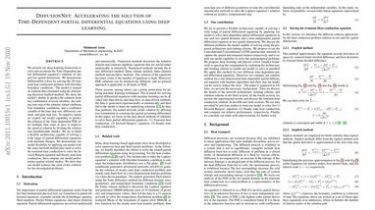DiffusionNet: Accelerating the solution of Time-Dependent partial differential equations using deep learning

We present our deep learning framework to solve and accelerate the Time-Dependent partial differential equation’s solution of one and two spatial dimensions. We demonstrate DiffusionNet solver by solving the 2D transient heat conduction problem with Dirichlet boundary conditions...
The model is trained on solution data calculated using the Alternating direction implicit method. We show the model’s ability to predict the solution from any combination of seven variables: the starting time step of the solution, initial condition, four boundary conditions, and a combined variable of the time step size, diffusivity constant, and grid step size. To improve